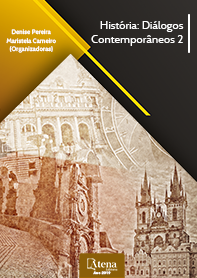
O PAI DOS POBRES: UM OLHAR SOBRE A ASCENÇÃO DO POPULISMO DE GETÚLIO VARGAS NO ESTADO NOVO
Este ensaio descreve, ainda que de
forma superficial, a trajetória e a importância
de Getúlio Vargas no fim da República Velha e
sua ascensão ao poder por meio da chamada
Revolução de 1930, originando o Estado Novo
e a forma de governar por meio de medidas
de caráter popular, denominadas Populismo. A
partir de uma breve analise literária, é possível
afirmar a importância da figura emblemática do
presidente no cenário nacional, bem como suas
ações que determinaram a estruturação da
política do Brasil durante o período denominado
“Era Vargas”.
O PAI DOS POBRES: UM OLHAR SOBRE A ASCENÇÃO DO POPULISMO DE GETÚLIO VARGAS NO ESTADO NOVO
-
DOI: 10.22533/at.ed.60019230814
-
Palavras-chave: Participação; Populismo; Revolução.
-
Keywords: Participation; Populism; Revolution.
-
Abstract:
This essay describes, albeit
superficially, the trajectory and importance of
Getúlio Vargas at the end of the Old Republic
and his rise to power through the so-called
Revolution of 1930, originating the Estado Novo
and the way of governing by means of measures
of popular character, called Populism. From
a brief literary analysis, it is possible to affirm
the importance of the emblematic figure of the
president in the national scene, as well as his
actions that determined the structuring of the
politics of Brazil during the period called "Era
Vargas".
-
Número de páginas: 15
- Eduardo Pimentel Menezes
- José Rolando Dupuy Parra


